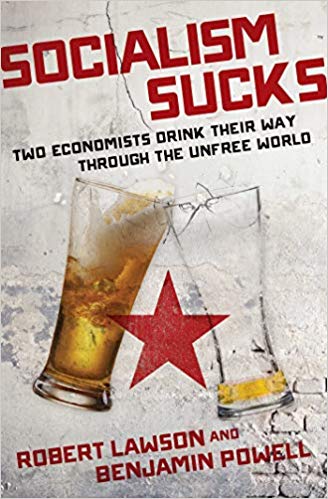Here’s a Way to Learn Comparative Systems
Comparative systems sounds like the class in college you didn’t want to take. But, hey, it’s a hugely important topic! How do nations get rich? Why are some nations poor? Why do they sometimes flip places?
Everyone wants to live a better life, so it makes sense to study the institutional conditions that enable people to do so. If we can’t figure that out, we’ve got a huge problem. The whole point of the social sciences – and economics in particular – is moot.
However, maybe you just don’t want to take that class. Maybe there is a better way to learn about what causes civilizations to rise and fall.
Here is the ticket. It’s called Socialism Sucks: Two Economists Drink their Way Through the Unfree World. You will laugh out loud on page after page. You will thrill in the adventures. You will guffaw at the sheer silliness of what these two dudes do and what they find. You will wish you had been with them but be very grateful that they both took time to write it all down.
Who are these guys?

The other is Robert Lawson. Seriously, I do wonder if there is a man alive who carries around in his head more detailed data on national economies around the world. He is the brains behind the Economic Freedom of the World index. I’ve had lunch with him and secretly tried to trip him up on obscure countries around the world and their issues with property rights and taxation and so on. It’s not possible. He is an encyclopedia.
Together they travel the world, sampling beers, wines, and liquors in great abundance, while sharing their insights into whether and to what extent government is making it hard for people to live better lives. Their conclusion is in the title, but there’s more going on. They prove here with anecdotes what they have shown countless times with data in more scholarly venues. So you get the benefits of science but with a smile and shot glass.
Along the way you discover that:
- Economists aren’t boring
- Economists are not disconnected from reality
- Economists really do think about the poor and what can help them
- Economists do get out from under their numbers and charts from time to time
- Economics is not dull; it’s thrilling!
- Economics is a beautiful science that elucidates gigantically important truths
Every chapter is super interesting, such as the one on China. They show how this once-socialist country of vast deprivation and starvation became “one of the greatest successes of its kind in human history.” True, it’s still crony capitalist with a police state but look at the progress. Give it time, and keep trading, you will see ever more economic miracles here.
The book does not neglect economic theory and history, as in the chapter on Russia shows in its discussion of the early years of communism and the problem of calculation under socialism. Here they recount forgotten history such as when a famous journalist visited Russia in the 1930s to proclaim it to be a heaven on earth. They document what even today people deny: communism was a disaster for the whole Russian empire. Even today, they recount, Russia and Ukraine suffer from a huge communist hangover.
The strangest chapter is perhaps the one about North Korea. Our authors didn’t set foot on the soil – they couldn’t get there from South Korea – but languished just inside China in the town of Dandong, with a river separating them from the communist utopia that somehow had no electrical lighting that worked. Their description of a sea of “dilapidated, beige, two-story concrete apartment homes with semi-caved-in orange-tiled roofs” sounds about right. It’s hard to believe that there is no other difference between North and South other than their economic systems. It’s the difference between a rich and wonderful life and a dark and dreary and hopeless existence.
So on it goes, through Cuba (no new cars, buildings falling down), Venezuela (once a wonderfully prosperous country, wrecked by socialism), Sweden (not really a socialist country), and back in the United States.
Listen, this is a truly fun book but it doesn’t neglect serious economics. You can learn a tremendous amount of theory and history from these two masters of the craft– and also discover how to have a great time while trying to alert the world to what is the single most important choice we face in the entire world today: freedom or government control.
I highly recommend this delightful romp. At the end, you can tell people that you took a course in comparative economics, while learning a tremendous amount about beer.










